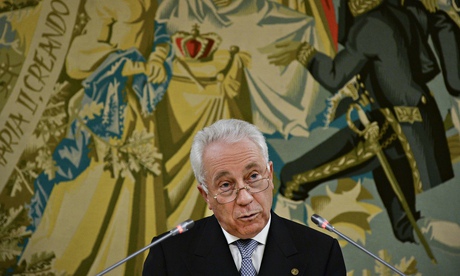Portugal uses EU bailout cash to shore up troubled Banco Espirito Santo.

Carlos Costa, governor of the Bank of Portugal, confirms the crisis-hit Banco Espirito Santo (BES) would receive a bailout amid fear of a bank run. Photograph: Patricia De Melo Moreira/AFP/Getty Images
Portugal injected almost €5bn into Banco Espírito Santo on Sunday night to stave off the collapse of the country's biggest bank following a series of financial scandals.
Carlos Costa, governor of the Bank of Portugal, said the bank's healthy businesses would be spun off into a "good" bank, while its toxic assets would be hived off into a "bad" bank.
The bailout plan, which was agreed with Brussels, was sparked by the far bigger than expected €3.5bn (£2.8bn) net loss reported last week by the bank. The loss wiped out its capital buffers and sent its shares falling by more than 75% before the stock was suspended on Friday.
Espírito Santo is expected to be delisted from the Lisbon stock exchange, meaning that shareholders will be wiped out.
Costa said the injection of money would come mostly from Portugal's international bailout, which made €6.4bn available for bank recapitalisation through a fund set up by Portugal in 2012.
The fund is aimed at limiting the political fallout from using taxpayers' money to prop up a bank at a time when Portugal is only just emerging from a deep economic downturn. Pedro Passos Coelho, the prime minister, had pledged that taxpayers would not be called on to bail out failing banks.
The "bad" bank will hold the troubled assets, mostly related to its exposure to the Espírito Santo family, which has faced difficulties after financial irregularities were uncovered at one of its array of holding companies last year.
An audit ordered by the Portuguese central bank earlier this year discovered material irregularities at the Luxembourg-registered ESI, part of the empire.
Ricardo Espírito Santo Salgado, the chief executive of Banco Espírito Santo, was forced to resign and he was detained last month in connection with an investigation into money laundering and tax evasion. Santo Salgado was understood to have been a voluntary witness and said in January 2013 that he had always paid his taxes.
The central bank ordered the bank to raise more capital, but potential investors were deterred by the publicity surrounding the allegations facing the wider group and the prospect of more impairments being revealed in the future.
Portugal was bailed out by the EU and International Monetary Fund with €78bn in 2011, but left the rescue programme in May. That has given the country more freedom, although it is still bound by requirements to reduce its budget deficit.
It still has €6.4bn left from the original €12bn put aside to recapitalise the banking industry. The fund is financed by all banks in Portugal and has representatives of the country's central bank and the government on its board.
Last month, concerns about the bank rattled European financial markets.